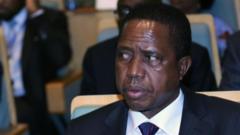Pedro Sánchez, the Prime Minister of Spain, finds himself in a precarious position as his government is rocked by allegations of corruption within his Socialist party (PSOE). After winning power by promising political integrity, Sánchez is now confronted with mounting public pressure to resign. Recently released audio recordings by civil guard investigators have implicated key party figures in discussing illicit commission payments related to public contracts, prompting Sánchez to issue an apology to the Spanish public on June 12. Although he has not been directly implicated, the scandal surrounding party secretary Santos Cerdán—who has resigned and will testify before the Supreme Court—poses a significant challenge to Sánchez's leadership.
Sánchez Under Siege: Spanish PM Faces Calls for Resignation Amid Corruption Scandals

Sánchez Under Siege: Spanish PM Faces Calls for Resignation Amid Corruption Scandals
Amid multiple investigations into corruption, Spanish Prime Minister Pedro Sánchez fights to retain his leadership as calls for his resignation grow louder.
Cerdán's situation is particularly troublesome for Sánchez, as his previous defense of Cerdán has now turned into a vulnerability. Investigations also involve former transport minister José Luis Ábalos and advisor Koldo García, both of whom vehemently deny any wrongdoing. Unlike Ábalos's earlier departure from the cabinet, which had cushioned the impact on Sánchez, Cerdán's scandal strikes at the heart of the party.
In the face of increasing scrutiny, Sánchez vowed to push through the current legislature, set to conclude in 2027. In a letter to PSOE members, he reiterated his commitment to confronting pressing national issues such as healthcare, housing, and climate change. Opposition parties have capitalized on these scandals, branding Sánchez's government as corrupt. Protests in parliament have echoed demands for resignation, with opposition leader Alberto Núñez Feijóo labeling Sánchez as the head of a corrupt establishment.
The implications of these investigations extend beyond Sánchez to his family, as both his wife, Begoña Gómez, and brother, David, are also under scrutiny for alleged business misconduct and influence peddling respectively. Amidst these challenges, Sánchez's supporters claim the investigations are politically motivated, orchestrated by rival conservative factions and media.
Political analysts suggest that a resignation could trigger new elections, benefitting opposition parties. The current political landscape shows a decline in leftist voter support and a rising mobilization of right-wing constituents, intensifying Sánchez's struggle to maintain his coalition government. The head of public opinion at Ipsos, Paco Camas, highlights that retaining parliamentary support is crucial to his survival, while murmurs of dissatisfaction grow louder among coalition partners.
As Sánchez prepares for an upcoming NATO summit in The Hague, he bears the dual burden of navigating international defense commitments while battling homegrown political threats. Despite promising to elevate military spending to meet NATO demands, he has resisted calls for an even higher target, raising further questions about his government's stability.
The coming weeks will likely prove pivotal for Sánchez, as he faces not only domestic political challenges but potential revelations that could shake the very foundations of his administration.
In the face of increasing scrutiny, Sánchez vowed to push through the current legislature, set to conclude in 2027. In a letter to PSOE members, he reiterated his commitment to confronting pressing national issues such as healthcare, housing, and climate change. Opposition parties have capitalized on these scandals, branding Sánchez's government as corrupt. Protests in parliament have echoed demands for resignation, with opposition leader Alberto Núñez Feijóo labeling Sánchez as the head of a corrupt establishment.
The implications of these investigations extend beyond Sánchez to his family, as both his wife, Begoña Gómez, and brother, David, are also under scrutiny for alleged business misconduct and influence peddling respectively. Amidst these challenges, Sánchez's supporters claim the investigations are politically motivated, orchestrated by rival conservative factions and media.
Political analysts suggest that a resignation could trigger new elections, benefitting opposition parties. The current political landscape shows a decline in leftist voter support and a rising mobilization of right-wing constituents, intensifying Sánchez's struggle to maintain his coalition government. The head of public opinion at Ipsos, Paco Camas, highlights that retaining parliamentary support is crucial to his survival, while murmurs of dissatisfaction grow louder among coalition partners.
As Sánchez prepares for an upcoming NATO summit in The Hague, he bears the dual burden of navigating international defense commitments while battling homegrown political threats. Despite promising to elevate military spending to meet NATO demands, he has resisted calls for an even higher target, raising further questions about his government's stability.
The coming weeks will likely prove pivotal for Sánchez, as he faces not only domestic political challenges but potential revelations that could shake the very foundations of his administration.




















